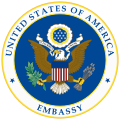History
The United States and Albania first established diplomatic relations in 1922, when Envoy Extraordinary and Minister Plenipotentiary Ulysses Grant-Smith presented credentials to the government of Albania in Tirana on December 4, 1922. During the Italian invasion of Albania in 1939, the relations ceased. Following World War II, with Albania under a Communist regime, it became one of the most isolated nations globally. Relations with the United States were dormant until the death of Enver Hoxha and the onset of political reforms in Albania. [1]
Diplomatic relations were reestablished on March 15, 1991. Albania received an invitation to join NATO in April 2008. [1]
On March 15, 2008, American and Albanian munitions experts who were planning on destroying stockpiles of obsolete ammunition set off a series of explosions that caused 26 deaths. [2] The U.S. Bureau of Alcohol, Tobacco, Firearms and Explosives (ATF) assisted in investigating the incident. [3] In July 2022, a cyberattack targeting Albania led to the expulsion of Iranian diplomats in September of the same year. The United States, following an investigation, supported Albania's assertion that Iran was responsible for the attack. [4]
This page is based on this
Wikipedia article Text is available under the
CC BY-SA 4.0 license; additional terms may apply.
Images, videos and audio are available under their respective licenses.


